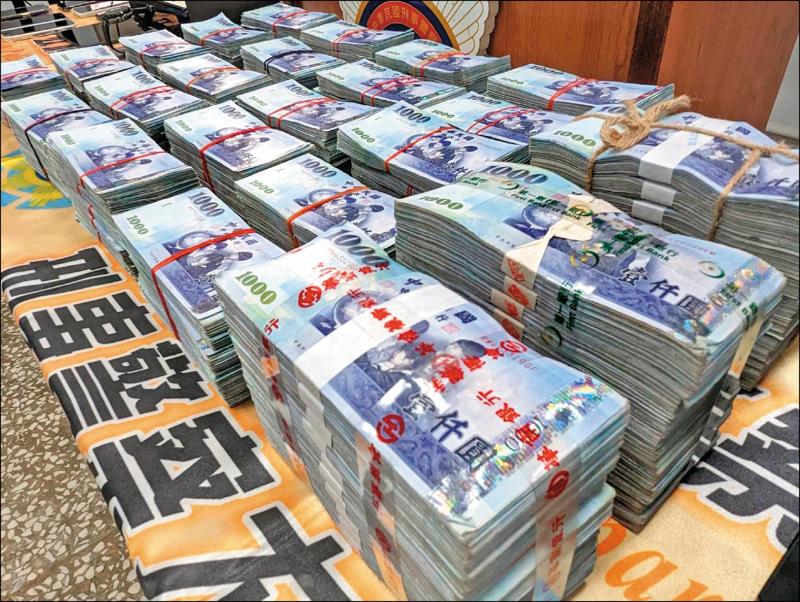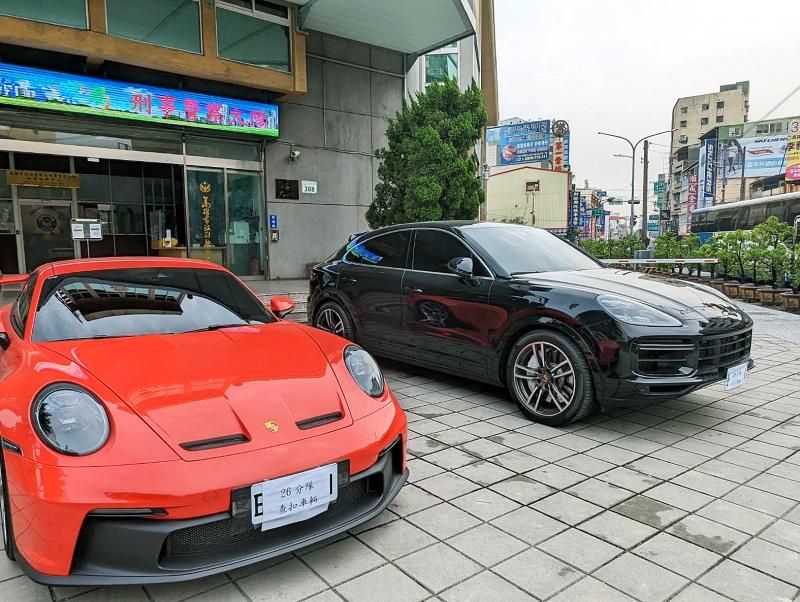Kaohsiung police last week busted a money laundering operation suspected of seeking to interfere in tomorrow’s local elections.
The operation was allegedly headed by a man surnamed Lee (李), who had received NT$9.5 billion (US$306.18 million) from China over the past six months, Kaohsiung police said yesterday, adding that Lee’s ring is suspected to be part of a larger Chinese effort to interfere in the elections and support pro-China candidates.
Officers arrested Lee, 35, and his girlfriend, searched his mansion, and seized the money he had allegedly received from China and three luxury vehicles, police said.

Photo courtesy of Kaohsiung police
The operation was disguised as an online gambling and betting site, police said, adding that they had surveilled Lee for several months after an investigation into an earlier money laundering case indicated that he is engaging in illegal activities.
Lee would be charged with contravening the Money Laundering Control Act (洗錢防制法), police said.
His communications records showed that he had contacts in China, who are suspected to be behind the fund transfers, police said, adding that the investigation is ongoing.

Photo courtesy of Kaohsiung police
The purpose of the transfers remains unclear, as does the identity of those involved in China, police said.
Lee’s operation might also be connected to rings uncovered earlier this year that had allegedly received large sums of money from Chinese operatives, they said.
Earlier this month, police searched a house owned by a couple in Taichung, where they seized NT$17 billion, allegedly originating in China, and four luxury vehicles in one of the largest such raids this year.
Prosecutor Chan Chang-hui (詹常輝) said the couple’s online gaming site allegedly also offered illicit banking and foreign remittance services, which were used by illegal gambling sites in China.
They might also have had links to Chinese government agencies seeking to interfere in the local elections, Chan said.
Prosecutors are working to “combat illegal Chinese money transfers to Taiwan,” Chan said, adding that this includes “cryptocurrencies, underground remittances and gaming proceeds.”
The Chinese government and its proxies had tried to interfere in previous elections by illegally funding the campaigns of pro-China candidates, Chan said, adding that this also involved illegal transfers to money laundering rings.
China also uses these strategies to destabilize Taiwan’s financial institutions and fund organized crime operations, as it seeks to undermine public safety in the nation, Chan said.
In the past, Beijing has helped pro-China candidates pay campaign expenses, including offices, vehicles, staff, printing costs, rallies and deposits for listing as candidates, Chan said.
It also funded candidates’ illegal vote-buying attempts, Chan added.

Intelligence agents have recorded 510,000 instances of “controversial information” being spread online by the Chinese Communist Party (CCP) so far this year, the National Security Bureau (NSB) said in a report yesterday, as it warned of artificial intelligence (AI) being employed to generate destabilizing misinformation. The bureau submitted a written report to the Legislative Yuan in preparation for National Security Bureau Director-General Tsai Ming-yen’s (蔡明彥) appearance before the Foreign Affairs and National Defense Committee today. The CCP has been using cognitive warfare to divide Taiwanese society by commenting on controversial issues such as Taiwan Semiconductor Manufacturing Co’s (TSMC, 台積電) investments in the

INVESTIGATION: The case is the latest instance of a DPP figure being implicated in an espionage network accused of allegedly leaking information to Chinese intelligence Democratic Progressive Party (DPP) member Ho Jen-chieh (何仁傑) was detained and held incommunicado yesterday on suspicion of spying for China during his tenure as assistant to then-minister of foreign affairs Joseph Wu (吳釗燮). The Taipei District Prosecutors’ Office said Ho was implicated during its investigation into alleged spying activities by former Presidential Office consultant Wu Shang-yu (吳尚雨). Prosecutors said there is reason to believe Ho breached the National Security Act (國家安全法) by leaking classified Ministry of Foreign Affairs information to Chinese intelligence. Following interrogation, prosecutors petitioned the Taipei District Court to detain Ho, citing concerns over potential collusion or tampering of evidence. The

‘COMPREHENSIVE PLAN’: Lin Chia-lung said that the government was ready to talk about a variety of issues, including investment in and purchases from the US The National Stabilization Fund (NSF) yesterday announced that it would step in to staunch stock market losses for the ninth time in the nation’s history. An NSF board meeting, originally scheduled for Monday next week, was moved to yesterday after stocks plummeted in the wake of US President Donald Trump’s announcement of 32 percent tariffs on Taiwan on Wednesday last week. Board members voted to support the stock market with the NT$500 billion (US$15.15 billion) fund, with injections of funds to begin as soon as today. The NSF in 2000 injected NT$120 billion to stabilize stocks, the most ever. The lowest amount it

NEGOTIATIONS: Taiwan has good relations with Washington and the outlook for the negotiations looks promising, Minister of Economic Affairs J.W. Kuo said Taiwan’s GDP growth this year is expected to decrease by 0.43 to 1.61 percentage points due to the effects of US tariffs, National Development Council (NDC) Minister Paul Liu (劉鏡清) said at a meeting of the legislature’s Economics Committee in Taipei yesterday, citing a preliminary estimate by a private research institution. Taiwan’s economy would be significantly affected by the 32 percent “reciprocal” tariffs slapped by the US, which took effect yesterday, Liu said, adding that GDP growth could fall below 3 percent and potentially even dip below 2 percent to 1.53 percent this year. The council has commissioned another institution